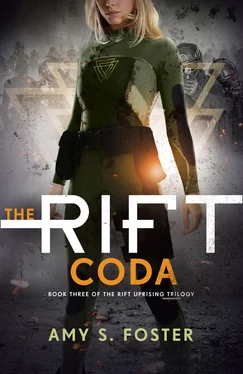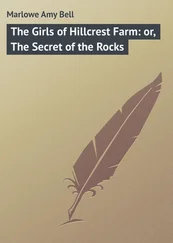Ezra volunteers to stay, which is convenient because I was going to ask him to anyway. Levi and I excuse ourselves. Ezra is so enraptured that he barely notices, which leaves me feeling surprisingly relieved.
Arif catches up with us on our way out of the lab. “We have a busy day today,” he says amiably. “However, one of the other Citadels can show you around the compound, even take you out of it and into the city if you wish.”
I glance at Levi. We have a body language shorthand now. One slight tilt of the head. A furtive look to the right. I know we are both thinking the same thing.
“That’s very kind of you, but I believe our time would be better spent debriefing in our quarters, thank you.” Arif shrugs amiably, and Levi and I head to my room.
We walk there in silence and I close the massive wooden door to my quarters and lean my body against it. Levi sits on the lushly piled rug and leans against the bed.
The bed frame is so high that his entire back is bolstered by it. We don’t say anything to each other, not at first. Soon enough there will be plenty of words and so we enjoy a few blissful moments of quiet.
Today we’re going to do our homework. We’re going to be soldiers. We’re going to pore over every intel file we have on the other Citadel races. We’re going to learn their languages. We’re going to see how they fight. And we’re going to make sure that Iathan and the Roones back on their Earth aren’t hiding anything from us. I’m not about to get blindsided again.
“Okay,” he says finally, snapping me out of my own head. “Where do you want to start?”
“With the Spiradaels. Those pig things ate the one hostage we had, and I want to know more about them.”
“I don’t think they can be turned, Ryn.”
“Neither do I. I just want to figure out the best way to kill them.”
“Other than getting eaten by pigs?” He holds up his hand to make it clear that’s a joke and pulls out his laptop so we can begin.
We spend hours learning the Spiradaels’ guttural language, which lacks any sort of flair and only a handful of words that are more than three syllables. We study the footage we have of the giant spindly Citadel race. We watch how they use their hair as a razor-like whip. We see how they block and punch. From fighting them personally, I know they don’t use their legs. It’s all upper body with them. I think I understand it now. It seems the joints on their arms, necks, and shoulders allow them to contort these appendages almost 360 degrees. I don’t think their knees do the same, so they focus on the chest and hair to win.
Over and over again we watch their fighting style and then we practice on each other, blocking and overcoming Spiradael attacks. I never could understand why the Blood Lust never kicked in during sparring, but it never has. This is just yet another mystery of how ARC works—how specific they were when they programmed us with the Blood Lust. It never interferes with our ability to fight an enemy. It only inserts itself if we try to have a life off the battlefield. After we finish with the Spiradaels, we begin with the Orsalines.
It takes all of an hour and forty-five minutes to learn their language. They simply don’t have that many words. I still can’t believe the altered Roones would choose them. If their genetic fuckery is this big gift, why waste it on dumb bear people? The secret must lie in not just their strength, which I am learning is far greater than I gave them credit for, but their devotion to the altered Roones. It’s religious with the Orsalines. They’re zealots and that might make them the most dangerous Citadels of all.
Levi and I study their fighting style. It’s actually not so much a style as out-and-out berserker mode. They don’t kick, because, well, bear legs. They don’t exactly punch, either, as much as they do maul. Mostly what they do is either claw opponents to death or squeeze them until their organs burst. Sometimes, they will just hurl a boulder at them. Or a tree.
Once again, Levi and I do maneuvers and I am grateful for this huge, almost empty room with its cathedral-like ceilings so that we can use the walls and beams to hang and jump from. Technically, we are stronger than the Orsalines. We have more physical strength than any other Citadel, but I would hate to be on the receiving end of one of those hugs. We each find effective ways to get out of these holds and how to keep moving to make sure their nails can’t get at us. They couldn’t penetrate the uniform, of course, but a lucky swipe at the neck while going for the face would lead to death pretty quickly.
After that, we hurry ourselves to the canteen, grab something that looks like a sandwich with some kind of meat and bottles of water with additional electrolytes. We’ve got a lot of work to do and not much time until the council we’ve agreed to have tomorrow.
The Daithi are the next Citadels we study. Their language is nuanced and many words are difficult to pronounce as they don’t use a lot of vowels, almost like Welsh. While the pronunciation and grammar is harder to grasp, the Daithi lexicon is more straightforward than most. There are very few words that mean the same thing, and it is abnormally absent of adverbs and adjectives. It is a language of nouns and verbs, of naming and doing. This in and of itself gives us further insight into their culture. The Daithi are as small as children, but that doesn’t make them any less dangerous. They are remarkably fast and their fighting style is more like a dance than combat. They move in quickly with deadly accuracy and move to another place in the blink of an eye. The Daithi rarely block. They seem to have little use for defensive fighting because in the footage we’ve seen where they engage, no one—not even the Settiku Hesh—gets close enough to land a punch.
Levi and I quickly realize that the only way to defeat the Daithi is if we don’t rely on sight. We need to use our other senses—smell, their heartbeats, the whirring rush of air when a fist or leg swings toward a body. This is especially difficult for me because of the stupid Kir-Abisat and the sound my own body is throwing off, but in a way, it’s good practice. It forces me to learn how to dampen it even more.
Levi blindfolds me, like the Jedi I’ve always wanted to be, and begins to attack. The first hurdle is just getting out of the way. I focus on his heartbeat and the heat signature his body gives off. When he lunges, eventually I get the hang of spinning away, ducking and rolling in a different direction. As cool as this is, it won’t actually help us defeat the Daithi. Together, Levi and I come up with strategies that will help us strike immediately after deflection. For this, we use not only combinations of punches and kicks from very strange angles, but our knives as well. Guns would be the most useful, of course. I’m never above just shooting someone, but if things go down the way they did with the Spiradaels, we’re going to need to fight them off long enough to talk to them.
We don’t bother leaving the room for dinner. We stuff our faces with the tasteless gel cubes provided by the SenMachs. They will give us the nutrition we need and save us valuable time. Besides, I’m not in any mood to deal with Ezra. I’m actually enjoying today. It feels good to be doing something I’m actually good at as opposed to all this fumbling around, second-guessing every word I say and how it will be interpreted.
When we move on to the Akshaji for the first time, I begin to feel truly afraid. I had been worried up till this point and anxious, of course, because of the sheer volume of puzzle pieces the altered Roones were trying to put together. The Akshaji are barely Citadels. They’ve been enhanced, certainly, but it’s clear they see the Rifts not as a call to duty, but as a form of endless entertainment.
Читать дальше












